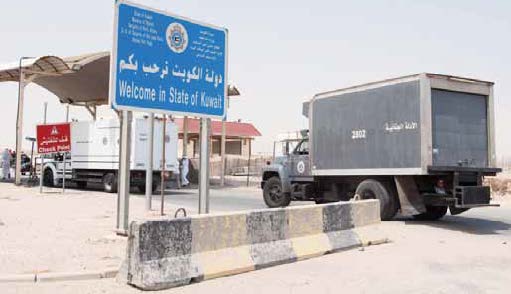Kuwait pursues POWs’ DNA examination at criminal evidences department

KUWAIT: Kuwait received yesterday human remains said to belong to slain Kuwaiti POWs from Iraqi authorities pending forensics’ examination locally. Handover of the human remains was organized at Al- Abdali border checkpoint, with attendance of Kuwaiti and Iraqi officials. Iraq had declared discovery of the remains saying they belonged to Kuwaitis. They are suspected to be of missing Kuwaitis and POWs, taken as prisoners and slain by personnel of the ousted Iraqi regime that invaded Kuwait on August 2, 1990, and occupied the Gulf state for seven months. The handing over of 48 human remains, which were put in caskets wrapped in Kuwaiti flags, is the first since the toppling of Saddam Hussein in a US-led invasion in 2003.
Kuwait says around 605 people, mostly Kuwaitis, went missing during the seven-month occupation and ensuing war. Iraqi military officials said the remains were found in a mass grave, in the desert about 170 km (106 miles) west of the city of Samawa in March. Tests have been performed and results confirm the remains’ identity, said Iraqi military and health officials attending the ceremony. “Iraq’s government is determined to keep searching for the remaining missing bodies of the Kuwaiti citizens and return them back to their families,” said army Major General Hazim Qasim.

Positive results
Yesterday’s handover of human remains is follow-up to a previous declaration by a Kuwaiti laboratory about positive results after examining samples that had been brought from Baghdad, a Kuwaiti official indicated. Rabie Al-Adsani, the head of the Kuwaiti delegation at the international tripartite commission and sub-committee tasked with the POWs file, said that in light of the positive results, Kuwait had addressed an official request to the Iraqi authorities to transfer the human remains to Kuwait to complete the examination at the Interior Ministry’s Criminal Evidence Department.
The Ministry of Interior department keeps a DNA database for the Kuwaiti POWs, thus it will conduct a test to determine whether the samples match, Adsani has explained. Adsani further noted that the DNA extraction for examination is a very complex and time consuming process. He expressed gratitude to the Iraqi authorities namely the ministry of defense, the International Committee of the Red Cross, the UN mission, members of the technical committee from Saudi Arabia, the US, the UK and France for their cooperation and fruitful efforts that led “to these positive results.”
The ICRC-affiliated tripartite commission declared in June discovery of human remains in Al-Muthanna, Al-Samawa, in southern Iraq, saying that they were suspected to belong to Kuwaiti prisoners. The committee had said that the bones were handed over to forensic department in Baghdad indicating that the DNA to be extracted from the skeletons would be compared to those of relatives of the missing persons. Iraqi authorities had handed over to Kuwait DNA samples for 32 corpses. In 2005, remains of Kuwaitis were located. The tripartite commission continues to look for missing peoples in the two countries related to the period of the 1990-1991 occupation
DNA testing
On July 24, Kuwait affirmed it would continue efforts to locate its Prisoners of War (POWs) and missing individuals in Iraq and will use all of its resources to achieve such goal. In a press release commenting on the findings of the technical committee of the International Committee of the Red Cross’s (ICRC) Tripartite Commission, Assistant Foreign Minister for International Organization Nasser Al-Hain said that Kuwait presented data to the commission and the Iraqi team involved in the search for the remains of Kuwaitis in Iraq.
The step led to the approval of DNA testing on the human remains found in Iraq recently, said Hain. He added that initial results had shown a match in the DNA samples of some of the remains, which promoted the State of Kuwait to request that, all of the discovered bodies would be sent to back its soil for further analysis. The tests will continue in Kuwait and the identities of the bodies will be revealed as soon as results are announced, indicated the official, adding that the families of the victims will be informed as the process goes on. Hain commended the tripartite commission and sub-committees for their efforts to uncover the fates of Kuwaiti POWs and missing persons and he thanked Iraqi authorities for efforts to facilitate procedures in finding the remains. He hoped that the long-awaited case of the fate of Kuwaitis and individuals from other nationalities would be closed to conclude this humanitarian tragedy.
On June 20, the ICRC-affiliated Tripartite Commission announced the discovery of human remains in southern Iraq with initial expectations pointing to the discovery of bodies of Kuwaiti citizens and other nationals.
The discovery gave hope to the families of the missing individuals who were taken away over 28 years ago. The commission gathers officials from Kuwait, Saudi Arabia, the US, the UK, France, and Iraq. In 2005, the remains of a number of Kuwaiti citizens were discovered in Iraq, while in 2011, the body remnants of Iraqi individuals were uncovered. The tripartite commission continues efforts to uncover the remains of people missing or killed in the 1990-1991 war to liberate Kuwait. Diplomatic ties between the two neighbors were cut after the invasion, which was ended by the 1991 Gulf War, but restored after Saddam Hussein’s removal from power in 2003. — Agencies










